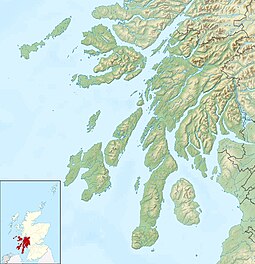Gigha
| Gaelic name | |
|---|---|
| Pronunciation | [ˈkʲi.ə] |
| Norse name | Guðey |
| Meaning of name | Old Norse, probably "God's island" or "good island" |
| Location | |
|
Gigha shown within Argyll and Bute
|
|
| OS grid reference | NR647498 |
| Coordinates | 55°41′N 5°45′W / 55.68°N 5.75°W |
| Physical geography | |
| Island group | Islay |
| Area | 1,395 hectares (5.39 sq mi) |
| Area rank | 41 |
| Highest elevation | Creag Bhàn 100 metres (328 ft) |
| Administration | |
| Sovereign state | United Kingdom |
| Country | Scotland |
| Council area | Argyll and Bute |
| Demographics | |
| Population | 163 |
| Population rank | 37 |
| Population density | 11.7 people/km2 |
| Largest settlement | Ardminish |
| References | |
| Pronunciation | ||
|---|---|---|
| Scots Gaelic: | An Dubh Sgeir | |
| Pronunciation: | [ən̪ˠ ˈt̪us̪kʲeɾʲ] | |
| Scots Gaelic: | Buaidh no Bàs | |
| Pronunciation: | [puəj nɔ paːs̪̪̪] | |
| Scots Gaelic: | Cnoc Haco | |
| Pronunciation: | [kɾɔ̃xk haxkɔ] | |
| Scots Gaelic: | Creag Bhàn | |
| Pronunciation: | [kʰrʲek vaːn] | |
| Scots Gaelic: | Creideas Dòchas is Carthannas | |
| Pronunciation: | [ˈkʰɾʲetʲəs̪ ˈt̪ɔːxəs̪ ɪs̪ ˈkʰaɾən̪ˠəs̪̪̪] | |
| Scots Gaelic: | gamhainn | |
| Pronunciation: | [ˈkãvəɲ] | |
| Scots Gaelic: | Gamhna Gioghach | |
| Pronunciation: | [ˈkãũnə ˈkʲi.əx] | |
| Scots Gaelic: | geodha | |
| Pronunciation: | [ˈkʲɔ.ə] | |
| Scots Gaelic: | Gioghach | |
| Pronunciation: | [ˈkʲi.əx] | |
The Isle of Gigha (/ˈɡiːə/; Scottish Gaelic: Giogha) is a small island off the west coast of Kintyre in Scotland. The island forms part of Argyll and Bute and has a usually resident population of about 160 people. The climate is mild with higher than average sunshine hours and the soils are fertile.
Gigha has a long history, having been inhabited continuously since prehistoric times. It may have had an important role during the Kingdom of Dalriada and is the ancestral home of Clan MacNeill. It fell under the control of the Norse and the Lords of the Isles before becoming incorporated into modern Scotland and saw a variety of conflicts during the medieval period.
The population of Gigha peaked at over 700 in the eighteenth century, but during the 20th century the island had numerous owners, which caused various problems in developing the island. By the beginning of the 21st century resident numbers had fallen to only 98. However a "community buy-out" in 2002 has transformed the island, which now has a growing population and a variety of new commercial activities to complement farming and tourism.
Attractions on the island include Achamore Gardens and the abundant wildlife, especially seabirds. There have been numerous shipwrecks on the surrounding rocks and skerries.
The Hebrides have been occupied by the speakers of at least four languages since the Iron Age, and many of the names of these islands have more than one possible meaning as a result. Many modern authorities hold that the name "Gigha" is probably derived either from the Norse Guðey or from Gud-øy, meaning either "good island" or "God island". The Norse historical text Hákonar saga Hákonarsonar explicitly calls the island Guðey.
...
Wikipedia

